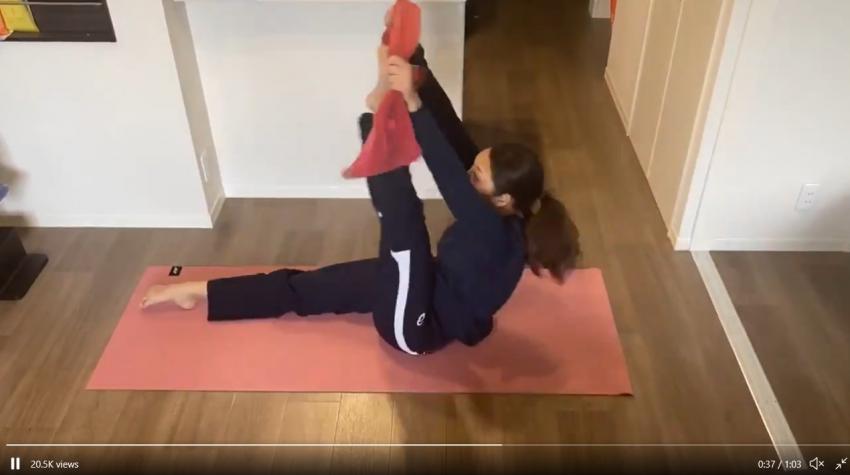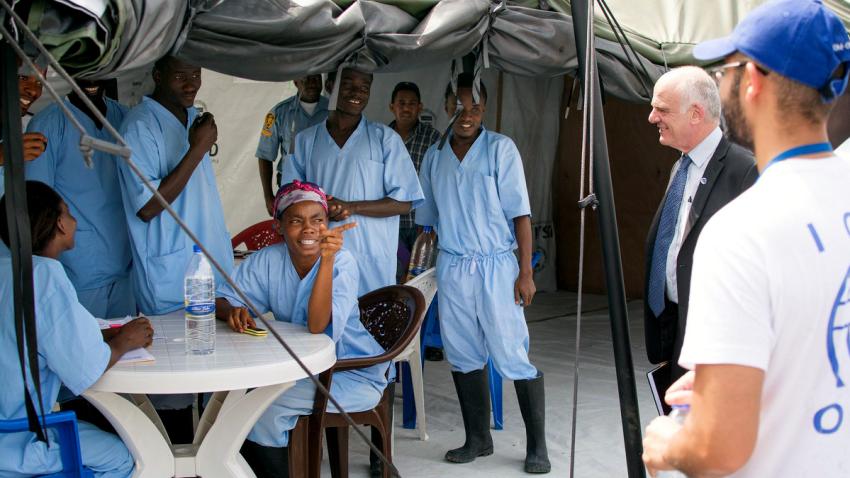“What you need is a simple towel,” says Mitsui Risako, bronze medalist at the Rio 2016 Olympics in artistic swimming. She is not talking about after you get out of the water, though. She is one of Japan’s many top athletes who are sharing their training-at-home regimes, advising cocooned fans – or anyone following common hashtags like #SportsAssistYou, #Stayhome, and #Staystrong – about ways to stay fit and healthy.
“We athletes are empowered by the encouragement we get when we compete. Now we are giving back to express our gratitude for society and support during these challenging weeks,” explains Sawano Daichi, Japan’s record holder in pole vault.
Sawano is chairperson of the Japanese Olympic Committee (JOC) Athletes Commission. He was one of the top contenders at the Rio 2016 Olympics and hopes to compete in the next Olympic Games in Tokyo. He joined forces with Mitsui and other members of JOC Athletes Commission to launch this social media campaign from all across the athletic community. The International Olympic Committee is encouraging athletes to build on the tradition of the Olympic Games: transcending borders to inspire and unite people everywhere.
Some are showing how to train themselves at home and giving tips for a healthy diet, others are expressing their gratitude to healthcare providers and those supporting lifeline activities. Their messages also include heartfelt greetings to their fans, tips on good hand hygiene, ways to make time at home more meaningful, and mental health tips. While their messages vary, they stay true to delivering the lessons they have learned over the course of their lives: to succeed in the face of tough competition and physical and mental demands requires discipline, determined resilience – and inspiration.
Tomita Uchu, a blind swimmer hoping to participate in his first Paralympic Games next year, called for solidarity to overcome the crisis together.

Blind swimmer Uchu Tomita shares words of encouragement in this Twitter video.
The campaign started on 17 April, almost as soon as Japan declared a nationwide state of emergency. Within three days, athletes from 47 sports – including Olympians and Paralympians such as Paralympian and Japanese Paralympic Committee President Kawai Junichi – had posted more than 230 messages. Many are keeping up the drumbeat.
One such video message from the two-time Olympic gold medalist in the men’s figure skating, Hanyu Yuzuru, was viewed more than 600,000 times in 10 days. “There is light we can see only in darkness,” he said, sharing a lesson rooted in his experience in his home town of Sendai after it was hit by a massive earthquake and tsunami in 2011.
“Athletes are also members of the community. We must observe the rules of the society by staying and training at home. We would like to contribute to our society through the power of sport, connecting people together for a common cause by giving them inspiration,” explains Sawano.
The power of sport to transform our societies by enhancing respect, mutual understanding, integration and dialogue – and by contributing to development and fulfillment of individuals no matter their age, gender, origins, or beliefs – is one the United Nations is working to harness. During this year’s International Day of Sport for Development and Peace (6 April), the United Nations encouraged people to be active during the quarantine, and to foster solidarity, community and team spirit. The absence of sports during these weeks is hard on athletes and fans alike. Just a few months ago, watching and participating in sports was one of life’s great pleasures. Athletes can still bring us together, inspire and energize us, as we wage a common fight to overcome the COVID-19 pandemic.




